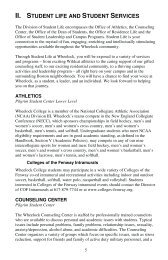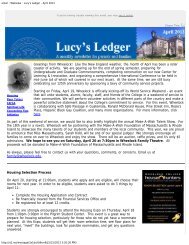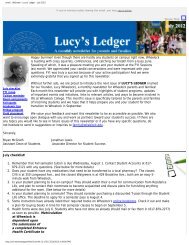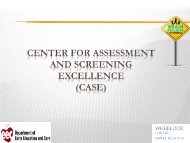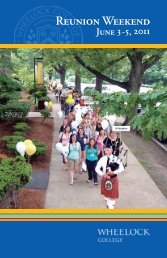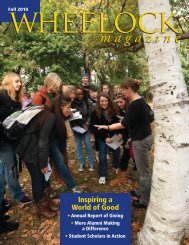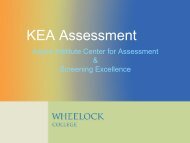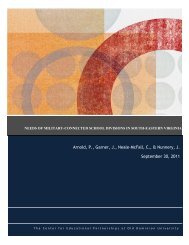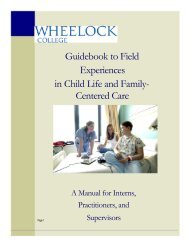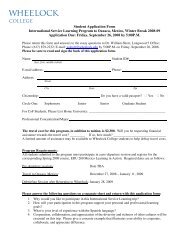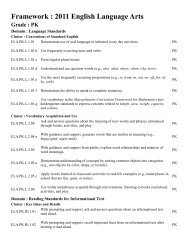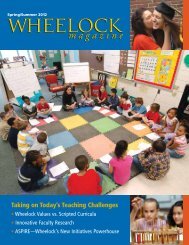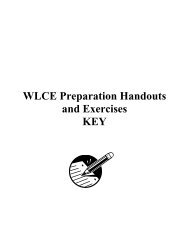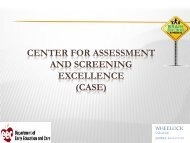Fall 2011 - Wheelock College
Fall 2011 - Wheelock College
Fall 2011 - Wheelock College
Create successful ePaper yourself
Turn your PDF publications into a flip-book with our unique Google optimized e-Paper software.
Leader in the<br />
Spotlight<br />
INTERVIEW<br />
Betty Bain Pearsall ’71<br />
University Director of Child Care,<br />
City University of New York<br />
As university director of child care at the<br />
City University of New York (CUNY),<br />
Betty Bain Pearsall ’71 coordinates CU-<br />
NY’s 19 child care centers and makes it<br />
possible for young parents to pursue higher<br />
education while knowing their children are<br />
getting quality care and education.“Caring<br />
for the whole child, supporting and mentoring<br />
the parent, teaching advocacy—every<br />
day I have an impact on hundreds of children<br />
and families, applying and passing on<br />
what I learned from <strong>Wheelock</strong>,” she says.<br />
WC: How did you decide on a career in early<br />
childhood education and care (ECEC), Betty?<br />
BP: Early childhood education and care has<br />
really always been a part of my life. My mother<br />
went to Hunter <strong>College</strong> and Bank Street <strong>College</strong><br />
of Education and taught 4-year-olds, and<br />
my godmother was director of a child care<br />
center in New York City where my great-aunt<br />
was also the cook and I substitute taught when<br />
I was a <strong>Wheelock</strong> undergrad home on vacation.<br />
Good quality education and care is a value my<br />
family is committed to.<br />
WC: And now you are at both ends of<br />
the educational spectrum, coordinating<br />
19 ECEC centers at the City University<br />
of New York?<br />
BP: Yes, at the City University campuses, we<br />
provide care only for children whose parents<br />
are students at the University. We do this because<br />
our emphasis is on access to and success<br />
in higher education. A <strong>Wheelock</strong> scholarship<br />
provided me with access to the foundation<br />
of my education, at a residential college, that<br />
broadened my experience in the world. This is<br />
similar to what I try to do at CUNY by providing<br />
quality child care and early education.<br />
For student parents, child care can be the<br />
main obstacle barring the way to higher education<br />
or to remaining in college once enrolled;<br />
this is especially so for first-generation college<br />
students. Having care available and knowing<br />
their children are getting quality care and an<br />
early childhood education allows parents to<br />
focus on their studies and achieve that goal of<br />
higher education.<br />
We provide other educational benefits too<br />
that build toward success for children and<br />
parents. Right from the start, the children at<br />
CUNY are in an environment where the goal<br />
of higher education is the norm; learning and<br />
growing in a community that cares about<br />
education are natural parts of their early experience.<br />
We also provide support and education<br />
sessions for parents so they can learn more<br />
about being strong advocates for their children<br />
and how to work with other parents to demand<br />
good child care and quality education later,<br />
after they have graduated and are working and<br />
their children are in school. We are helping<br />
educate parents to be leaders in advocacy.<br />
WC: You are also the president of the<br />
National Coalition for Campus Children’s<br />
Centers, a nonprofit organization dedi cated<br />
to supporting early childhood education<br />
in the college and university setting. How<br />
did you prepare to be such a leader?<br />
BP: I believe that experience builds on itself,<br />
and you grow into positions of responsibility<br />
and leadership. As I taught, I gained more<br />
and more experience in the classroom, and I<br />
pursued two master’s degrees and learned more<br />
through higher education. Then I went the next<br />
step and started an early care and childhood<br />
program at Queens <strong>College</strong>, where I developed<br />
more confidence and leadership and advocacy<br />
skills, and then I went to York <strong>College</strong>, where<br />
alumNi NeTwORK<br />
they were constructing a building and starting<br />
a child care program at the same time, so I<br />
worked with staff through this process. I was<br />
starting a program, advocating for funds, going<br />
to construction meetings, wearing a jacket to<br />
meet with the president, and then running<br />
down to attend to fixing faucets or hula with<br />
the children. I did it all and I learned from it all.<br />
But I think preparation for leadership began<br />
for me at <strong>Wheelock</strong> with faculty who challenged<br />
me and mentored my development and my<br />
sense of professionalism and commitment right<br />
from the start. I continue that model of education<br />
and mentoring of staff and parents in my<br />
role directing CUNY’s child care centers now.<br />
WC: You received a <strong>2011</strong> Making a Difference<br />
Award from <strong>Wheelock</strong> at Reunion, and you<br />
are a member of the Corporation. How do<br />
you think <strong>Wheelock</strong> has changed since your<br />
undergrad years and how is it the same?<br />
BP: When I was at <strong>Wheelock</strong>, I was inspired<br />
by the idealistic mission to make the world<br />
a better place for children, but I was one of<br />
few African-American students, and there<br />
was a general lack of cultural awareness and<br />
competency. It was a time when <strong>Wheelock</strong><br />
students couldn’t wear pants to class and had<br />
responsibilities at each dorm, such as tea duty<br />
or answering the door! But it was also a time<br />
of great change: The civil rights movement was<br />
strong; black students were speaking out and<br />
formed a student union; and there were the<br />
Vietnam War discussions and protests.<br />
From what I see of today’s <strong>Wheelock</strong>, it has<br />
that same idealistic mission that inspired me;<br />
however, it is more diverse, and there is more<br />
awareness of the importance of cultural competency.<br />
And it’s wonderful to see the <strong>College</strong><br />
capitalizing on its outstanding faculty and taking<br />
the lead in advocating for children in so many<br />
new ways. When I reflect back, it is amazing to<br />
me how much I was absorbing and learning,<br />
even talking informally with faculty, and how<br />
strong the faculty was and still is today.<br />
WC: Do you have a message for today’s<br />
<strong>Wheelock</strong> students?<br />
BP: Take advantage of all that is offered to you<br />
at <strong>Wheelock</strong>. You may not know the impact of<br />
all the interactions you are having on campus,<br />
all the classes; but take in the knowledge, all of<br />
it. Decide on your dream and then follow it.<br />
<strong>Wheelock</strong> has a lot to offer, and when you get<br />
into the world, you will realize how important<br />
your <strong>Wheelock</strong> experience is and will be for the<br />
rest of your life. It will take you far.<br />
<strong>Wheelock</strong> Magazine 23



